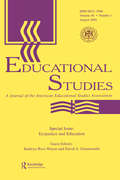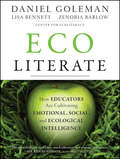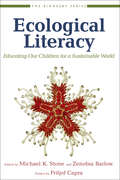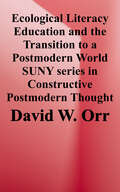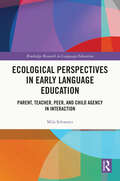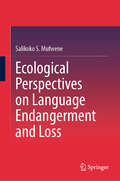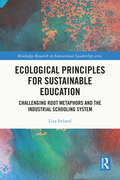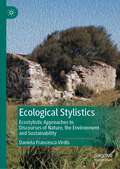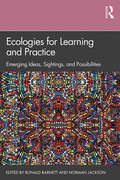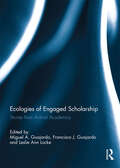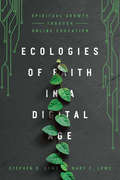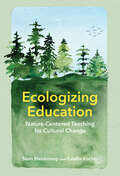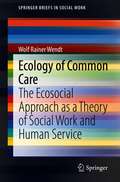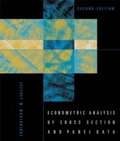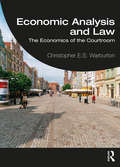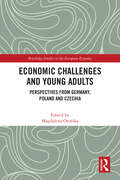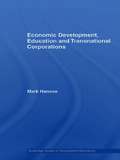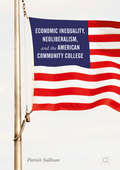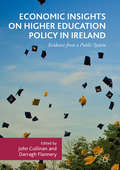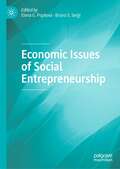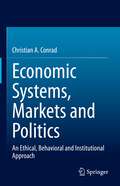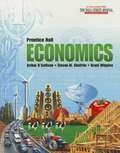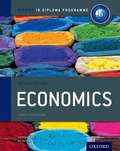- Table View
- List View
Ecojustice and Education: A Special Issue of educational Studies
by David A. Gruenewald Kathryn Ross WayneFirst Published in 2004. Routledge is an imprint of Taylor & Francis, an informa company.
Ecoliterate: How Educators Are Cultivating Emotional, Social, and Ecological Intelligence
by Daniel Goleman Lisa Bennett Zenobia BarlowA new integration of Goleman's emotional, social, and ecological intelligence Hopeful, eloquent, and bold, Ecoliterate offers inspiring stories, practical guidance, and an exciting new model of education that builds - in vitally important ways - on the success of social and emotional learning by addressing today's most important ecological issues. This book shares stories of pioneering educators, students, and activists engaged in issues related to food, water, oil, and coal in communities from the mountains of Appalachia to a small village in the Arctic; the deserts of New Mexico to the coast of New Orleans; and the streets of Oakland, California to the hills of South Carolina. Ecoliterate marks a rich collaboration between Daniel Goleman and the Center for Ecoliteracy, an organization best known for its pioneering work with school gardens, school lunches, and integrating ecological principles and sustainability into school curricula. For nearly twenty years the Center has worked with schools and organizations in more than 400 communities across the United States and numerous other countries. Ecoliterate also presents five core practices of emotionally and socially engaged ecoliteracy and a professional development guide.
Ecological Literacy
by Fritjof Capra David W. Orr Zenobia Barlow Michael K. StoneReorienting the way human beings live on the earth and educating children to their highest capacities have much in common, say the thinkers and educators behind this groundbreaking book. Both endeavors must be viewed and pursued in the context of systems: familial, geographic, ecological, political. And our efforts to build sustainable communities cannot succeed unless future generations learn how to partner with natural systems to our mutual benefit. In other words, they must become "ecologically literate."The concept of "ecological literacy" advanced by this book's creators, the Center for Ecoliteracy in Berkeley, California, extends beyond the discipline of environmental education. It aims, as David W. Orr writes in his foreword, "toward a deeper transformation of the substance, process, and scope of education at all levels."The reports and essays gathered in the book reveal the remarkable work being conducted by the Center's extensive network of partners. In one middle school, for example, culinary icon Alice Waters founded a program that not only provides students with healthy meals but teaches them to garden-and thus to study life cycles and energy flows-as part of their curriculum. Other hands-on student projects supported by the Center and described in the book range from stream restoration and watershed exploration to confronting environmental justice issues at the neighborhood level.With contributions from distinguished writers and educators, such as Fritjof Capra, Wendell Berry, and Michael Ableman, Ecological Literacy marries theory and practice based on the best thinking about how the world actually works and how learning occurs. Parents and educators everywhere who are engaged in creative efforts to develop new curricula and improve children's ecological understanding will find this book to be an invaluable resource.
Ecological Literacy: Education and the Transition to a Postmodern World (SUNY Series in Constructive Postmodern Thought Ser.)
by David W. OrrThe most important discoveries of the 20th century exist not in the realm of science, medicine, or technology, but rather in the dawning awareness of the earth's limits and how those limits will affect human evolution. Humanity has reached a crossroad where various ecological catastrophes meet what some call sustainable development. While a great deal of attention has been given to what governments, corporations, utilities, international agencies, and private citizens can do to help in the transition to sustainability, little thought has been given to what schools, colleges, and universities can do. <p><p>Ecological Literacy asks how the discovery of finiteness affects the content and substance of education. Given the limits of the earth, what should people know and how should they learn it?
Ecological Perspectives in Early Language Education: Parent, Teacher, Peer, and Child Agency in Interaction (Routledge Research in Language Education)
by Mila SchwartzThis book presents ecological perspectives towards early language education that conceptualise the phenomenon of interactions between child language-based agency, teachers’ agency, peers’ agency and parents’ agency, consequently furthering insights into the lives of young children growing up in multilingual homes.Drawing on rich empirical research evidence, the book explores teachers’ and family strategies and practices aimed at enhancing children’s interest in home language maintenance and enrichment as well as in the novel language learning. It defines early language education as the education of children up to the age of 6 and considers international evidence of children’s language from diverse sociolinguistic backgrounds and indigenous, endangered, heritage, regional, minority, majority, and marginalized languages, as well as foreign and second languages in education at home and out-of-home settings. It claims that only through collaboration between teachers, families, peers, and close environment, can the child be engaged in early language learning and fully experience his or her potential to act as agent in a novel language learning.The book will be of great interest to researchers, academics, and postgraduate students in the fields of language education, multilingualism, applied linguistics, and early childhood education. Practitioners in these fields may also find the volume a valuable resource.
Ecological Perspectives on Language Endangerment and Loss
by Salikoko S. MufweneThis book discusses various issues arising from the dominant discourse on language endangerment and loss in linguistics. Are the terms mother tongue, heritage language, and ancestral language interchangeable? Does a child receiving formal education in a mother tongue different from that or those of his/her parents lose a culture that he/she &“should&” otherwise inherit? Is a language separate from the culture in which its speakers evolve and it is being practiced? Thus, is a population shifting to a dominant language necessarily abandoning its traditional culture ipso facto or is it also reshaping it along with that associated with the new language into a new, mixed culture? Are cultures intended to be static? Must speakers of particular languages be wedded to them in the same way they are to their genes? What can we learn about language shift, language vitality, and human adaptiveness from the protracted history of mankind? These and a host of other issues regarding the intertwining of colonization, globalization, language, and culture are discussed in this book, inviting linguists and other interested scholars to be critical participants in the current debate.
Ecological Principles for Sustainable Education: Challenging Root Metaphors and the Industrial Schooling System (Routledge Research in Educational Leadership)
by Liza IrelandThis book explores how the education sector can transition to being truly sustainable and why necessary innovations for educational change are being subverted and undermined when mapped onto the existing industrial educational system.Based on PhD case study research with schools that are modelling and teaching sustainability, action research, and the author’s 40 years of working in the K-12 system, this volume examines how education continues to perpetuate the status quo, and why education innovations are thus undermined. It shows the importance of redesigning education based on the principles of sustainable living systems and explores how this can be achieved across all levels of the educational system. The first part of the book establishes a new vision of sustainable education, whilst the second brings to light the industrial mechanistic root metaphors in current practice across leadership and administration, buildings and grounds, curriculum design, teaching, and learning that are subverting innovative efforts. From understanding the foundational, influential, problematic root metaphors of our "Industrial" educational system, it moves to explore how the ecological principles of sustainability can be used to rethink and redesign an educational system, from its administration, leadership, and policy, to curriculum, buildings, grounds and resources, through to teaching and learning, that will support sustainability, innovation, and creativity, developing systems thinking and sustainability as a frame of mind.Exploring how the education sector can transition to being truly sustainable and find new ways to traverse the problematic "Industrial" world view at this pivotal moment, will appeal to administrators, post-secondary educators, policymakers, and researchers and scholars of sustainability education, educational leadership, curriculum design, and educational philosophy.
Ecological Stylistics: Ecostylistic Approaches to Discourses of Nature, the Environment and Sustainability
by Daniela Francesca VirdisThis book reflects the cutting edge in ecostylistic approaches to nature, the environment and sustainability as represented in contemporary non-literary discourse. Firstly, the book presents the ecolinguistic and stylistic terms and theories applied in this ecostylistic analysis (ecosophy, beneficial, ambivalent and destructive discourses; and foregrounding, point of view, metaphor), and reviews the most recent literature in the field of ecostylistics. Secondly, the book examines the occurrences of five marker words (nature, environment, ecosystem, ecology, sustainability) on the websites of five environmental organisations and agencies (Forestry England, Greenpeace International, National Park Service, Navdanya International, World Wide Fund for Nature). The main research purpose of this study is to identify beneficial discourses in the environet and to investigate the beneficial ecostylistic strategies utilised to produce them. Above all, this book reminds us humans that we do not stand apart from nature: we are a part of it. The book will be of interest to scholars of stylistics, ecolinguistics and ecocriticism, as well as scholars of discourse analysis, environmental communication and environmental humanities.
Ecologies for Learning and Practice: Emerging Ideas, Sightings, and Possibilities
by Ronald Barnett Norman JacksonEcologies for Learning and Practice provides the first systematic account of the ideas of learning ecologies and ecologies of practice and locates the two concepts within the context of our contemporary world. It focuses on how individuals and society are being presented with all manner of learning challenges arising from fluidities and disruptions, which extend across all domains of life. This book examines emerging ways of understanding and living purposively in these new fluidities and provides fresh perspectives on the way we learn and achieve in such dynamic contexts. Providing an insight into the research of a range of internationally renowned contributors, this book explores diverse topics from the higher education and adult learning worlds. These include: The challenges faced by education systems today The concept of ecologies for learning and practice The role and responsibility of higher education institutions in advancing ecological approaches to learning The different eco-social systems of the world—local and global, economic, cultural, practical, technological, and ethical How adult learners might create and manage their own ecologies for learning and practice in order to sustain themselves and flourish With its proposals for individual and institutional learning in the 21st century and concerns for our sustainability in a fragile world, Ecologies for Learning and Practice is an essential guide for all who seek to encourage and facilitate learning in a world that is fundamentally ecological in nature.
Ecologies of Engaged Scholarship: Stories from Activist Academics
by Miguel A. Guajardo, Francisco J. Guajardo and Leslie Ann LockeStory and auto-ethnography are study methods based on decolonizing and liberating research perspectives. Stories, auto-ethnographies, and other qualitative methodologies enable the researcher/educator to be both a research instrument and an object in their study. Stories allow for the examination of personal growth, its effect on practice, and their impact on community. The researcher/educator is able to witness her/his own life as they collaborate with participants. Through the use of story, auto-ethnography, and other qualitative methodologies, researchers/educators can link the history of self within their community/activist work to its present conditions as they map their collective community’s future. Ecologies of Engaged Scholarship explores the use of story and auto-ethnography as a tool to know ‘self’ and ‘other’ in relationship to capacity building, pedagogical processes, and activist scholarship. It highlights activist-scholarship to better understand the epistemology and landscape of activist research. Contributors to the book self-identify as activist-scholars or scholar-activists, and in their unique chapters they consider the values informing their work, the origins and nature of their work, and how they make meaning of their work. They also consider how family and/or community has been involved, how previous schooling experiences have affected their trajectory, and how particular relationships have worked to influence their philosophical understanding. This book was originally published as a special issue of the International Journal of Qualitative Studies in Education.
Ecologies of Faith: Spiritual Growth through Online Education
by Stephen D. Lowe Mary E. LoweMany Christian institutions have embraced new technologies, especially online education. But is it possible for us to grow spiritually through our digital communities? Steve Lowe and Mary Lowe, longtime proponents of online education, trace the motif of spiritual growth through Scripture and consider how students and professors alike might foster digital ecologies in which spiritual transformation can take place.
Ecologizing Education: Nature-Centered Teaching for Cultural Change
by Sean Blenkinsop Estella C. KuchtaEcologizing Education explores how we can reenvision education to meet the demands of an unjust and rapidly changing world. Going beyond "green" schooling programs that aim only to shape behavior, Sean Blenkinsop and Estella Kuchta advance a pedagogical approach that seeks to instills eco-conscious and socially just change at the cultural level. Ecologizing education, as this approach is called, involves identifying and working to overcome anti-ecological features of contemporary education. This approach, called ecologizing education, aims to develop a classroom culture in sync with the more-than-human world where diversity and interdependency are intrinsic.Blenkinsop and Kuchta illustrate this educational paradigm shift through the real-world stories of two public elementary schools located in British Columbia. They show that this approach to learning starts with recognizing the environmental and social injustices that pervade our industrialized societies. By documenting how ecologizing education helps children create new relationships with the natural world and move toward mutual healing, Blenkinsop and Kuchta offer a roadmap for what may be the most potent chance we have at meaningful change in the face of myriad climate crises. Timely, practical, and ultimately inspirational, Ecologizing Education is vital reading for any parent, caregiver, environmentalist, or educator looking for wholistic education that places nature and the environment front and center.
Ecology of Common Care: The Ecosocial Approach as a Theory of Social Work and Human Service (SpringerBriefs in Social Work)
by Wolf Rainer WendtThis book offers an ecological foundation for social work and for care provision in general. It presents the ecosocial approach according to its origins, distinguishing it from other theoretical social work approaches and applying it to various areas of care for welfare. The ecological anchoring of social welfare and common care is an emerging topic in political, organisational, and person-related development of human services and social work. In an era of crisis, this anchoring is an essential contribution to the study of sustainable social provision. The book embeds the dispositions about it in the ecology of the protection and securing of common life. Ecology of Common Care: The Ecosocial Approach as a Theory of Social Work and Human Service is an essential text that should engage the academic community of educators and researchers in social work and other human services professions, as well as students in bachelor's and master's programmes in these professions.
Econometric Analysis of Cross Section and Panel Data, Second Edition
by Jeffrey M. WooldridgeThe second edition of this acclaimed graduate text provides a unified treatment of two methods used in contemporary econometric research, cross section and data panel methods. By focusing on assumptions that can be given behavioral content, the book maintains an appropriate level of rigor while emphasizing intuitive thinking. The analysis covers both linear and nonlinear models, including models with dynamics and/or individual heterogeneity. In addition to general estimation frameworks (particular methods of moments and maximum likelihood), specific linear and nonlinear methods are covered in detail, including probit and logit models and their multivariate, Tobit models, models for count data, censored and missing data schemes, causal (or treatment) effects, and duration analysis.Econometric Analysis of Cross Section and Panel Data was the first graduate econometrics text to focus on microeconomic data structures, allowing assumptions to be separated into population and sampling assumptions. This second edition has been substantially updated and revised. Improvements include a broader class of models for missing data problems; more detailed treatment of cluster problems, an important topic for empirical researchers; expanded discussion of "generalized instrumental variables" (GIV) estimation; new coverage (based on the author's own recent research) of inverse probability weighting; a more complete framework for estimating treatment effects with panel data, and a firmly established link between econometric approaches to nonlinear panel data and the "generalized estimating equation" literature popular in statistics and other fields. New attention is given to explaining when particular econometric methods can be applied; the goal is not only to tell readers what does work, but why certain "obvious" procedures do not. The numerous included exercises, both theoretical and computer-based, allow the reader to extend methods covered in the text and discover new insights.
Economic Analysis and Law: The Economics of the Courtroom
by Christopher E.S. WarburtonA comprehensive presentation of the use of economics in judicial decisions, the book is structured to provide all the foundational concepts that are important for the application of economics to the development and interpretation of statutes that emanate from economic conditions. The diversity of the economic field defines the scope of the book and its relevance to the study of law and rule adjudication. Beyond the positive dimensions of law and economics, the book evaluates the normative aspects of law and economics when laws are imprecise, and markets are inefficient. The ethical scope of transactions and rule adjudication are further considered in the context of professional ethics and the rationale for ethical considerations in the practice of law and economics. It presents a unique analysis of law, finance, and economics, by taking a look at the intricate quantitative requirements that are essential for scientific knowledge in the courtroom and the international dimensions of the practice of law and economics beyond municipal frontiers. It alerts entrepreneurs to risk exposures in the global economy and provides foundational information for readers who are also interested in international law and economics, and the essence and interpretations of international conventions appertaining to money, expropriation, the environment, and investments in international financial markets. This book is a useful reference for both undergraduate and graduate students who are interested in law and economics, forensic economics, corporate white-collar crime, and legal studies. It is also valuable for certificate programs for paralegals who wish to have a basic understanding of economic and financial concepts.
Economic Challenges and Young Adults: Perspectives from Germany, Poland and Czechia (Routledge Studies in the European Economy)
by Magdalena OsińskaIn recent years, there has been an unprecedented shift in the attitudes of young individuals towards the key economic issues they encounter as they embark on their adult lives. Sociologists have identified two distinct generations, namely Generation Y and Generation Z, which exhibit behaviours contrary to those of their parents and older generations. The reasons behind these shifts are shared across European countries, where these generations have experienced lives characterized by peace, cultural diversity, globalization, economic stability, relative economic and social well-being, as well as parental care and education.Addressing a gap in the economic literature, this book uniquely bridges the current understanding of youth with empirical evidence specific to Central and Eastern European Countries, represented by Poland and Czechia. Germany was taken as an example of a Western European Country. The novelty lies in identifying the contemporary trends and determinants shaping the decision-making process of young adults regarding the labour market, savings and investments, job satisfaction, retirement, and sustainable consumption. The book draws on a theoretical foundation from both economic and sociological perspectives. The book comprises ten interconnected chapters, each contributing to the central theme of youth intentions and attitudes toward economic/financial issues. The summary is presented from the perspective of contemporary megatrends.The target audience includes students and researchers in fields related to contemporary economic challenges—such as economics, psychology, and sociology. Given the challenges faced by young adults from post-socialist states, implementing the policy recommendations in the book may contribute to reducing the gap between them and their counterparts in Western European countries. Institutions involved in social policy, including both non-governmental organizations and public entities, will also find the policy implications to be of interest.
Economic Development, Education and Transnational Corporations (Routledge Studies In Development Economics Ser.)
by Mark HansonThis book focuses on the questions of: why do some economically disadvantaged nations develop significantly faster than others, and what roles do their educational systems play? In the early 1960s Mexico and South Korea were both equally underdeveloped agrarian societies. Since that time, the development strategies pursued by each country resulted
Economic Inequality, Neoliberalism, and the American Community College
by Patrick SullivanThis book aims to deepen public understanding of the community college and to challenge our longstanding reliance on a deficit model for defining this important, powerful, and transformative institution. Featuring a unique combination of data and research, Sullivan seeks to help redefine, update, and reshape public perception about community colleges. This book gives serious attention to student voices, and includes narratives written by community college students about their experiences attending college at an open admissions institution. Sullivan examines the history of the modern community college and the economic model that is driving much of the current discussion in higher education today. Sullivan argues that the community college has done much to promote social justice and economic equality in America since the founding of the modern community college in 1947 by the Truman Commission.
Economic Insights on Higher Education Policy in Ireland
by John Cullinan Darragh FlanneryThis book brings together research relating to the economics of higher education in Ireland and presents evidence that will help support policy decision making. It provides an analysis of prominent issues within the higher education sector from an economic viewpoint, discussing the relevant theory and offering an empirical analysis. The book examines three broad themes with a specific focus on issues related to undergraduate education: participation and preferences, progression and outcomes, and benefits and financing. Each chapter presents an accessible, non-specialist analysis of the topic of interest, making it relevant to a wider audience. In doing so, the book provides an important addition to our current knowledge and understanding of higher education in Ireland from an economic perspective. Key chapters discuss the factors influencing institution choices, student retention in higher education, and policy debates surrounding student finance. The book will serve as a useful and up-to-date resource for policymakers, researchers, academics and students across a range of disciplines, both in Ireland and internationally.
Economic Issues of Social Entrepreneurship
by Elena G. Popkova Bruno S. SergiSocial entrepreneurship is one of the most controversial actualities of the modern economy. On the one hand, social entrepreneurship makes up for "market failures" and prevents the deficit of socially essential goods and services in the marketplace, acting as their supplier. On the other hand, the survival of social entrepreneurship in an aggressive market environment is a challenging task, the fulfilment of which may distort the original essence of social entrepreneurship. Comprising a collection of research presented at the International Scientific Conference Advanced Issues on Social Entrepreneurship, this contributed volume offers a global economic analysis of social entrepreneurship. Whilst social entrepreneurship is indispensable to the modern economy, the current controversial model of its organization means it cannot fully accomplish its mission. This book offers potential solutions to this problem with the global and national strategies of economic growth and social progress. It includes a focus on emerging markets, in which the role of social entrepreneurship is especially high. This book is aimed at scholars and students who are interested in social entrepreneurship and corporate economics, and practitioners involved in this field. It will also be of interest to policy makers in the development and implementation of a national economic policy for support for social entrepreneurship in emerging markets.
Economic Systems, Markets and Politics: An Ethical, Behavioral and Institutional Approach
by Christian A. ConradThis textbook takes a new approach to economics by taking into account behavioral sciences and ethics. The basics of institutional economics are the starting point of the book, which are combined with insights from business ethics and behavioral science. It analyzes human behavior in order to discover incentives for economic agents to behave in a welfare-maximizing way, and analyzes the impact of human behavior and morality on economic systems, markets and politics. This textbook draws from new research results from behavioral economics, as well as from other disciplines, such as psychology and sociology, thus leading to new conclusions for economic science. The book sheds light on how people behave and how such behavior can be guided towards moral welfare for everyone. Furthermore, the reader is introduced to behavioral games, and to how these can be used to study economic behavior. Each chapter contains a summary on behavioral science findings as well as one on ethical findings. This book is a must read for advanced students in economics and political science but can also be of use to researchers of economics, as well as policymakers and business executives due to its focus on applications.
Economic Theory 12th Standard - Tamilnadu Board
by Training State Council of Educational ResearchEconomic Theory Textbook for the 12th Standard Students, preparing for Tamil Nadu State Board Exam.
Economics
by Arthur O'Sullivan Steven M. Sheffrin Grant WigginsThis book is a multidimensional, comprehensive high school economics program designed to help students achieve an understanding of key economic principles and their application in the real-world by using Essential Questions, Personal Finance topics and cutting edge technology.
Economics
by Jocelyn Blink Ian DortonThe only DP resources developed with the IB. Our bestselling IB Diploma course book for Economics has been revised and updated in line with the 2011 syllabus change.
